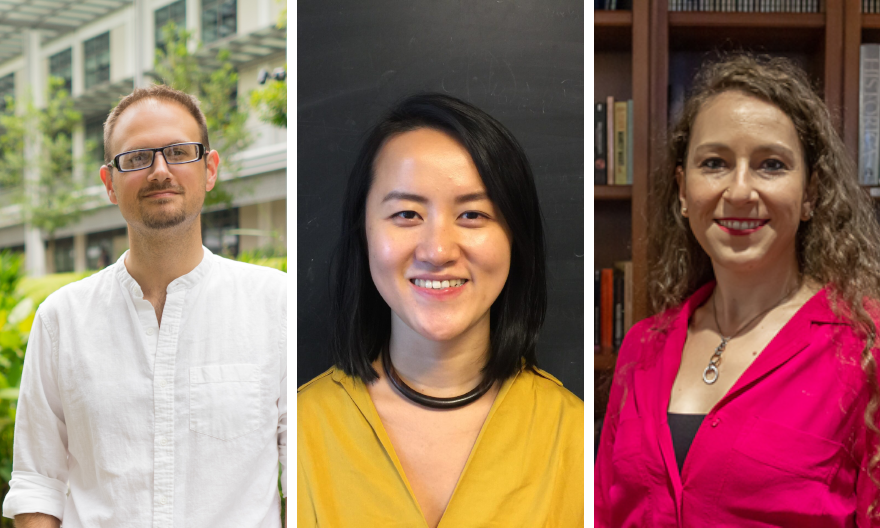Teaching Awards celebrate Yale-NUS faculty members
Award winners reflect on their experiences teaching at the College
Every year, the Yale-NUS College Teaching Awards honour faculty members who make invaluable contributions to students’ learning at the College. Be it their teaching style, eye-opening courses, or warm personality, these award winners leave a significant impact on their students.
 From left: Associate Professor Andrew Bailey, Assistant Professor Xing Xia and Dr Francesca Spagnuolo.
From left: Associate Professor Andrew Bailey, Assistant Professor Xing Xia and Dr Francesca Spagnuolo.
For the 2024 awards, Associate Professor of Humanities (Philosophy) Andrew Bailey was awarded the Distinguished Teaching Award, while Assistant Professor of Social Sciences (Economics) Xing Xia and Assistant Dean and Senior Lecturer of Science (Mathematics) Francesca Spagnuolo received the Early Career Teaching Award. We spoke to the three faculty members to learn more about their experiences teaching at Yale-NUS and their thoughts on teaching.
Congratulations on receiving the Teaching Award! Can you share your thoughts about receiving the award?
Assoc Prof Bailey: Teaching is the College’s mission; it’s why we’re here. So receiving our Distinguished Teaching Award is the highest honour I could ask for from the College, and one I’ll treasure forever.
Asst Prof Xia: It is a great honour to receive this recognition, particularly at an institution where all the instructors are excellent teachers who care deeply about teaching. I am grateful to all the students and colleagues who have supported and selected me for this award. I’m also grateful to all the students who have taken a class with me. My colleagues often joke that I am a tough teacher who demands a lot of effort from students in my class. This teaching award, more than anything, is a reflection of the curiosity, engagement, and perseverance of those students who have endured and thrived in my classes.
Dr Spagnuolo: I feel extremely grateful and honoured. It means a lot to me to be recognised for my teaching, even more so as we have so many talented professors in Yale-NUS.
What do you enjoy most about teaching at Yale-NUS and what was one of the most memorable moments for you?
Assoc Prof Bailey: The joy at the heart of my career has been spending time with curious young people talking about things that matter. A lot of memories pile up after over a decade of doing that. The ones that stand out the most often involve students somehow surprising me: an impromptu rap in class, a truly bizarre case study in a paper, a cheeky parody, that sort of thing.
Asst Prof Xia: I think the diversity of our student body has made teaching really enjoyable. The diversity of students’ background and perspectives has really contributed to the richness of our classroom discussions. When we discuss economic policy in my classes, students have always brought in a diverse set of perspectives and policy concerns to discussion. This helps them learn from each other.
I also appreciated the great colleagues I have had over the years at Yale-NUS. Some of them really challenged me to grow as an educator — to think about the purpose of each lesson and the intentions I bring to each class and to each interaction with students. Some of them have generously shared their teaching practices and philosophies with me. I am indebted to my colleagues for my growth as an educator.
Dr Spagnuolo: I love teaching in a small class setting and building a relationship with the students. The interest that students show in each course makes teaching them always an enriching and rewarding experience. I find it difficult to choose one moment: for each semester I have fond memories for classes, office hours and just random discussions shared with students. I cherish the memories of each “wow moment” in my math classes, in which students understand problems or proofs they have been fighting to get, and the collaborative spirit in all my courses, that each time take a different perspective.
How would you describe your teaching style and why did you adopt it?
Assoc Prof Bailey: Some teachers meticulously plan. Others improvise freely. After setting a vague structure for things ahead of time, I tend towards the latter strategy. I prefer to not know ahead of time what’s going to happen in class; life is more fun that way, and we all learn together.
Asst Prof Xia: In the classroom, I try to cultivate curiosity and encourage active learning. For example, I often begin each lesson with a set of policy-oriented questions that motivate the economic models and empirical tools under consideration. I then employ an inquiry-based approach to introduce these models and empirical methods. This involves a combination of concise lectures and carefully crafted in-class activities in which students engage in problem-solving, participate in small-group discussions, and participate in open debate. In my classrooms, questions are welcome at any moment. I reward and acknowledge thoughtful questions to underscore their importance.
I also try to promote effortful behaviour by encouraging students to embrace challenges and overcome their fear of failure. When designing in-class exercises and take-home assignments, I place a strong emphasis on recognizing and rewarding effort, rather than solely fixating on correct answers. I provide guidance and feedback so that students learn to approach challenging questions at their own pace and gradually overcome any initial apprehension toward complex questions. I encourage students to share their mistakes and discuss what we can collectively learn from common mistakes.
Dr Spagnuolo: Interactive and student centred. I like my classes to be a dialogue with the students instead of a one-way conversation. It can be hard sometimes, in particular in pure mathematics, as it requires extra effort from both sides. I am immensely grateful for the students I had in my courses: they have always been ready and open to learning and participating, making my job easier and fun.





